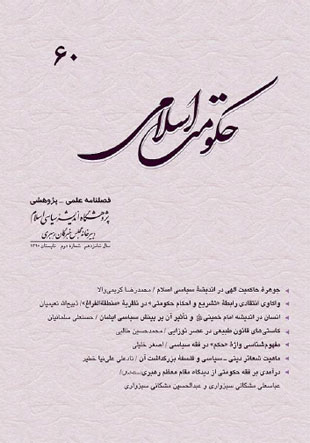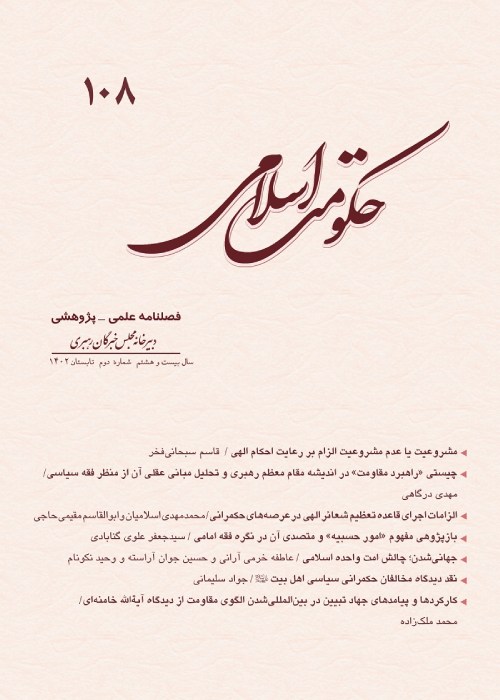فهرست مطالب

نشریه حکومت اسلامی
سال شانزدهم شماره 2 (پیاپی 60، تابستان 1390)
- ویژة اندیشه و فقه سیاسی اسلام
- 200 صفحه، بهای روی جلد: 15,000ريال
- تاریخ انتشار: 1390/07/20
- تعداد عناوین: 8
-
-
صفحه 103
-
صفحه 185
-
Page 5The distinction between political thought in Islam and other political thoughts in explaining divine rule and the priority it has over them regarding the key role of the element of divine permission and its rational relation with the true rule or the very Turth is something hidden. On the one hand, divine rule has a divine hue, and it possesses legitmacy on the other. According to the political system in Islam the most important indicator of the relation of rule with the Truth is the guardians and powerful ruler's undertaking the responsibility of caliphate and divine guardianship and with regard to the outside aspect, the divine characteristics they enjoy, even though the vicegerency of a perfect man never means entrusting things to him, ignoring part of the presence God and ascribing to him a station of divinity and lordship. The present article seeks to discuss the question of divine rule by relying on the evidence derived from the high doctrines of Islam which, unlike the notion of theoeracy in the West, tries to show that if people's will and determination in choosing their political future is negated, there will be no correlation between divine rule and other kinds of non divine authority. Islamic doctrines firmly oppose the idea of a specific group exclusively holding the reins of government on behalf of the Divine in order to handle and manage things independntly and the idea that none other than them can directly contact God, people are but subjects having duties to carry out, – deprived of any free will and political or social choice and all they should do is to obey orders.
-
Page 33Martyr Seyyed Muhammad Baqir al-Sadr has defined the famous theory of "the discretionary sphere of the Law” which concerns governmental judgements as a crystalization of the guardian jurist's prerogatives. It is noted in his account of this theory that the prerogatives of the guardian jurist and Islamic government relating the judgements are not obligatory. The question which arises here is whether the divine commands are not properly decreed in the domain of legislation and demonstration or whether he proposed such an idea in this theory. In other words, can this theory be regarded as an interpretation of the theory of tasweeb (approval)? This article gives a negative answer, and what Martyr Sadar means is that the guardian jurist's prerogatives fall in the province of non-obligatory in Islamic law, to which the idea of “the discretionary sphere of the Law” refers. Therefore, this theory cannot be considered as a sort of transition from the Islamic thought that divine injunctions embrace all things. The normative criticism which may be directed to this theory is that the Muslim ruler's prerogatives to issue governmental judgements cannot be considered restricted to non-obligatory shari injunctions, rather the Muslim ruler can transcend this limit in issuing governmental judgements according to certain standards
-
Page 57Thoughts and political systems are usually the outcome of a set of fundamental thoughts. One of these fundamental thoughts is “anthropology”. This article is centred on how Imam Khomeini thinks of man and how this view is displayed in his attitudes and speeches. The present article shows that Imam Khomeini's attitude towards man is an entirely religious one and derived from sources of mysticism and transcendent theosophy. In Imam Khomeini's anthropolgical view, man is a non-corporal being with a mere spirit, good nature and different aspects, so that he can move towards the path of good or evil. Of course, with justice and spirituality he pursue the way leading to perfection. Therefore, the statesmen and politicians ought to direct the political system and elements of politics towards thriving human nature and man's sublimity.
-
Page 85Due to the lack of a record on the subjects related to the principles of natural law in the works of Muslim thinkers and in order to establish a theory and develop a scientific study which identifies the principles of natural law in Islam, it is necessary to scrutinize the doctrine of natural law in the West especially in the Christian period because great attention was paid to religious criteria in the West in that period. The thinkers of the Renaissance (from the 14th to the 16th centuries A.D.) revived the humanistic thought of ancient Greek sophists in all fields of knowledge by abandoning the theocentric thought of the Mediaeval Ages. Although the doctrine of natural law began to decline in the first half of the Renaissance, it was not completely forgotten. Late scholastic thinkers and early Protestants did their best to revive the idea of natural law. This research elaborates at the outset on the view of the late scholastic thinkers concerning natural law. Then it sheds light on the two mentioned explanations of this doctrine.
-
Page 103"Hukm" literally means firmness, accuracy and impenetrability, but the synonym of hukm given in many lexicons, as we will then refer, is its implications, not its meaning. In fiqh and Usool (principles of Islam), hukm refers to shari discourse and its consequence (such as obligation and prohibition), fatwa (verdict), judicial judgement, and guardina's and governmental commands. In Arabic, the word hokuma [government] and the word hukm [judgement] are cognate. In fiqh, it means arsh (indemnity) and in Usool it is used to mean the control of an argument over another argument in expansion and contraction, which is the very conventional government and conventional accomplishment to which Mohaqiq Khorasani refers in his theology. This word is also used in politics to mean a governing body. Wilayat (guardianship) literally means the way two or more things are arranged having no interaagent. This sort of state implies nearness. In fiqh, this word is referred to as supervision which is similar to guardianship. Judegment is of various kinds. The most common kind of it is the governmental judgement of the guardian jurist (a judgement which is issued by a guardian and government with the aim of managing social affairs on the basis of interest and necessity). The other kind is judicial judgement, (application of laws and postulates to their cases and means according to the judge's view) and a primary and secondary judgement (inherent and non-inherent judgement of any subject).
-
Page 131The word sha'ā'ir (rituals) in its literal sense is the plural of sha‘irah, meaning a palpable and evident sign of something, and "rituals of God" means apparent signs that make remembrence of Allah firm in the hearts. The decree of rituals, giving high importance to rituls and the necessity to perform them are confirmed in the Quranic verse 32 – Surah Hajj, Pilgrimage. Giving high importance to rituals is intended to preserve rememberance of Allah which, in turn, leads to the preserving of divine religion in society and deepening it in man's heart, because people are often inflnenced by the senses and through observation. The senses of rituals are not necessiraly limited to hajj rites referred to in the Qur’anic verses, rather they may include the practices that are palable and irreplaceable signs which deepen the rememberence of the Truth in the hearts. Also when by "the sacrted things of God" we mean rituals, the domain of divine rituals will cover a broader area. This coverage of meaning is noticed in the contents of the narrations. But this does not mean that its instances are determined by common law. Therefore, in case of the practices which are not stated in holy texts and there is uncertainty about their being rituals only those which are confirmed will do. Otherwise, they lead to the spread of superstitions and innovations.
-
Page 155The grand leader has chosen the word "governmental fiqh" for the ideal and society-building fiqh of Ahal Bayt school. This word, compared to "individual fiqh", is used to mean a kind of holistic view governing all the main subjects of fiqh according to which all fiqhi inferences must be based on the fiqh of social system management and all the main subjects of fiqh are to do with running the country and social affairs. Accordingly, the area of study about governmental fiqh will not be related only topolitical questions; rather all the main subjects and questions on fiqh will be covered. This is because the government and Islamic system has various concerns and, in order to meet the needs of the government, human society and Islamic system, the faqih has to delve into all the questions relating to economics, culture, law, politics, military affairs, policing strategy, family, personal status and all the affairs connected to both physical and spiritual human living. Emphasising the importance of this kind of attitude towards fiqh, the grand leader calls for setting up a new fiqh founded on this way of thinking. In addition to the grand leader's general view of fiqh that includes all fiqhi areas and his emphasis on faqih's attention to fiqhi inference according to the mentioned attitude, he attracted the attention to the effect and distinction of this view of the verdicts issued by the faqih.


